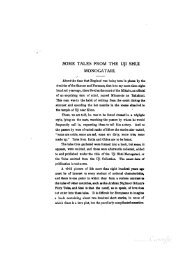Chau Ju-Kua - University of Oregon Libraries
Chau Ju-Kua - University of Oregon Libraries
Chau Ju-Kua - University of Oregon Libraries
You also want an ePaper? Increase the reach of your titles
YUMPU automatically turns print PDFs into web optimized ePapers that Google loves.
100 CHOIiA DOMINION. 1,19<br />
cerning the kings <strong>of</strong> Chu-lien, Ma Tuan-lin and the Simg-shi (loc. cit.) supply a few additional<br />
facts <strong>of</strong> considerable interest. They say: «At the present time it is stated that the ruling sove-<br />
reigns (<strong>of</strong> Chu-lien) have reigned for three generations)). The first mission from Chu-lien to<br />
China, in 1015, stated that the king <strong>of</strong> their country was called Lo-ts'a-lo-tsa, which probably<br />
stands for Kaja-raja. In 1033 the Chu-lien envoy said his king was called ShI-lo-lo-cha yin-to- 5<br />
lo-chu-lo, which may well be Sri Raja Indra Chela; and in 1077 the king <strong>of</strong> Chu-lien, his envoy<br />
stated at that time, was Ti-hua-kia-lo, standing probably for Dewar Kala (or Kara or.Deva-kuIa).<br />
Kashideddin (Elliot, Hist, <strong>of</strong> India, I, 69) says^the king <strong>of</strong> Ma'bar was called Dewar, M'hich<br />
means in the Mabar language, the olord <strong>of</strong> wealth». The words oat the present time» very<br />
probably mean «at the time <strong>of</strong> the mission <strong>of</strong> 1077», and this date would appear to be the latest 10<br />
for any <strong>of</strong> the information given by Sung writers concerning Chu-lien, their earliest information<br />
going back to 1015, when the first mission came to China. Cf. Gerini, Kesearches, 609,624.<br />
The Ling-wai-tai-ta, after the words quoted in our text has «the king's cap has on it<br />
lustrous pearls and other jewels)). Duarte Barbosa speaking <strong>of</strong> the king <strong>of</strong> Calicut, says «This<br />
king has a thousand waiting women, to whom he gives regular pay, and they are always at the 15<br />
court, to sweep the palaces and houses <strong>of</strong> the king: and this he does for state, because fifty would<br />
be enough to sweep . . . And these women do not all serve, but take turns in the service . . . i; . D u a r t e<br />
Barbosa, Descript. coasts <strong>of</strong> East Africa and Malabar, 111. (Hakl. Soc. edit.).<br />
7) Probably a kind <strong>of</strong> very fine muslin, made in various localities <strong>of</strong> western Asia. Our<br />
author mentions «white yue-no cloth» as a product <strong>of</strong> Baghdad and <strong>of</strong> Ki-tz'i-ni (Ghazni), and 20<br />
«gold spangled yiXe-no cloth)) as a manufacture <strong>of</strong> Damascus (Lu-mei). See infra, Pt. II, Ch. XXVII.<br />
8) Quotation from the Ling-wai-tai-ta, loc. cit. After the words quoted in the first paragraph<br />
it continues: aand there are some who bestow upon them (the elephants) embroidered<br />
housings and golden mangers. Every day the elephants are taken into the presence <strong>of</strong> the king.<br />
The king, his <strong>of</strong>ficers and the people all twist their hair into a knot, and wrap (themselves) in white 25<br />
cotton cloth. They make coins <strong>of</strong> gold and silver. The country produces ( HJ) finger-rings, camphor,<br />
cat's-eyes and such like things; also pearls, elephants' tusks, amber <strong>of</strong> diiferent colours and cotton<br />
stuffs with coloured silk threads ("m ^^ "llj)"-<br />
9) The yu-Tcan, t'6ng-lo, and kan-lo are, so far as I am aware, unidentified. aK'un-lun<br />
plums may have been a fruit also met with in the Malay (K'un-lun) country. The Tcan-lo is said 30<br />
in the Shi-ki to be the same as the Tcan-mau-sun ("H' /j^ •^)- ^^^ China Review, XIX, 193.<br />
This does not help us, however.<br />
10) Most <strong>of</strong> these flowers are indetermined, the names seem to be foreign. Instead <strong>of</strong> sho-<br />
ts i-sang the Simg-shi (489), which reproduces this paragraph, has sM-ts'i-fo ('^). Sang is the<br />
Chinese name <strong>of</strong> the mulberry tree, but here the character is probably used phonetically. 35<br />
11) The passage in brackets is taken from the Ling-wai-tai-ta, loc. cit. Chou K'u-fei,<br />
<strong>Chau</strong> <strong>Ju</strong>-kua, Ma Tuan-lin and the author <strong>of</strong> the Sung-sh!, all appear to have derived their<br />
information concerning this mission from one and the same written source. Ma and the Sung-shl<br />
(489,20—m) contain information not found in the works <strong>of</strong> the two earlier writers. The Sung-shi says<br />
the principal envoy from Chu-lien was called So-li San-won (^^ J9 ^^ ^);So-li, I take it, 40<br />
represents the name Chola. Concerning the voyage <strong>of</strong> the mission to China, this envoy said:<br />
wAfter leaving Chu-lien they had sailed for 77 days and nights, during which they passed the<br />
island (or headland) <strong>of</strong> Na-wu-tan (^ ^ ^ |lj ) and the island <strong>of</strong> So-li Si-lan (^ M<br />
® ^ ill Ceylon <strong>of</strong> the Cholas?), and came to the country <strong>of</strong> Chan-pin (Jb ^ not identified,<br />
but presumably in Pegu). Thence going 61 days and nights they passed the island <strong>of</strong> I-ma-lo-li 45<br />
°°* identified), and ^W nH' ^E S. came to the country <strong>of</strong> Ku-lo ("dtr ^S possibly on W.<br />
coast Malay Peninsula, but see infra, p. 124, n. 25), in which there is a mountain called Ku-lo,<br />
from which the country takes its name.<br />
«Proceeding again 71 days and nights and passing the island <strong>of</strong> Kia-pa Chx\ /V \\\<br />
not identified), the island <strong>of</strong> Chan (or Ku)-pu-lau {^ [or ~^'\ ^ ^ Cham pulo) and the 50<br />
island <strong>of</strong> Ch6u-pau-lung (-^ ^ ^^ not identified), they came to the country <strong>of</strong> San-fo-ts'i.<br />
aGoing again for 18 days and nights and having crossed (or passed by B^ ) the mouth <strong>of</strong><br />
the Man-shan river (? ^ |Jj -^ P in Kamboja?) and the T'ien-chu islands (^ hk |Jj

















